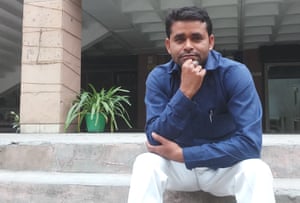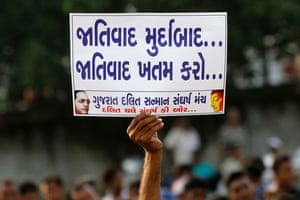The dusty, nondescript road has long been a no-go area, on pain of death, for bridegrooms from the Dalit caste and their wedding processions.
In July, however, on a date yet to be fixed, Sanjay Kumar Jadav, 27, will lead his parade of male relatives – called the “baraat” – down the road in Nizampur village. The group will pass the houses of upper caste Hindus who fear they will be “tainted” by his passing, to where his fiancee Sheetal lives. There, the couple will be married.
Jadav is a new kind of Dalit, the lowest caste in Hinduism. Formerly known as untouchables, the Dalits are fed up with the humiliating customs and class prejudice they have endured, and are mobilising against a system that refuses to wither away.
Slightly greater prosperity and higher levels of education have made the younger generation aspirational. They won’t turn away from a fight. There is a new assertiveness.

Jadav is confident, educated – studying law at Aligarh Muslim University – and ready to take on any social rule that degrades or diminishes him. His position as a social worker in his village, using his education to help people of all castes apply for ID cards and welfare benefits, has reinforced his self-respect.
“I refuse to be defined by my caste. I am much more than that,” he says during a visit to New Delhi, the Indian capital. When he first announced last year that he planned to take his baraat past the exclusion zone where the upper caste, land-owning Thakurs live, outrage erupted.
“The Thakurs told me no Dalit had ever done anything so outrageous. Dalit bridegrooms are expected to take the route on the outskirts of the village, avoiding the main road. We are not allowed to ride a horse. We have to walk. They said it was against tradition. I said it was time to destroy that tradition,” he says.
Jadav went further and ordered himself a horse and a band. In some places, Dalit bridegrooms have been killed or beaten up by upper caste men for riding a horse, because it is seen as insubordination. Nor are they allowed to sport a moustache or wear sunglasses.
Jadav took his case to the local court and then the high court in Allahabad. His petition was dismissed. The more obstacles he faced, the more determined he became.
In April, by way of punishment for his persistence in the courts, the Thakurs in Nizampur cut off water to Dalit fields. “The cauliflower, cucumber, chilli, tomato and onions all died. It was a warning. Sheetal has heard the Thakurs saying that, once the wedding is over and the police have gone, they will have their revenge,” he says.
In Sheetal’s village, the 50 Thakur families outnumber the 15 Dalit households. As a child, Jadav lived in a village where power was more balanced, with 400 Dalit families and about 420 Thakur.
Yet he still remembers being refused drinking water by a Thakur. One day, he saw musicians performing at a festival. The main artist was playing the dholak, a cylindrical drum. Members of the high-caste audience sat on the ground while the drummer played on the raised stage.
“I decided there and then to learn to play the dholak, purely to be on a stage, to be on a higher level, while the upper castes sit below me. It took me two years, but I play it rather well now and I feel good when I look down on them,” he says, grinning. “It’s symbolic.”
As an educated Dalit, he believes he must use his schooling to fight for his community’s rights. “I knew I had to get an education to fight for my rights. Now if I, as an educated person, can’t get justice for my community, then who will?
“Am I not a Hindu? If I am not, let the government tell me and I will find another religion. Am I not a citizen? Don’t I have the right to walk down a public road as guaranteed by the constitution? Shouldn’t the police come out and support my right instead of telling me to back off because of tradition?”

Jadav had hoped that some politicians would back his demand. However, while the ruling Bharatiya Janata party is acutely conscious of the importance of winning the votes of 200 million Dalits in next year’s election – the prime minister, Narendra Modi, has told his MPs to dine at a Dalit house once a month as a gesture of solidarity – no one in the BJP or any other party has spoken out in support of him.
Nonetheless, after months of wrangling in Nizampur, a truce was finally reached last month. Prodded by the police and the media storm, the Thakurs agreed to let his wedding procession travel along the main road.
A new route has been chalked out. The band and white horse are booked. Invitations to the media have gone out. Armed police will be posted on the route.
But he won’t be surprised if he sees some empty homes as he rides down the main road at the head of the procession. “Some Thakurs have said they are leaving their homes on the day because they won’t be able to bear the sight.
“Isn’t that funny?”